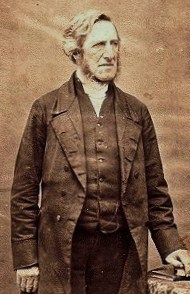
studied law at Trinity College, Dublin, and then in London. While completing his studies there, at age 23, Kelly was convicted of sin through studying the Hebrew Bible Concordance written by well-known, powerful English Evangelical preacher, William Romaine. Finding that all his efforts to reform were useless, Kelly at last obtained "peace with God through our Lord Jesus Christ".
Kelly abandoned the study of law and went home to become a clergyman in the Church of Ireland, but his radical preaching on ‘Justification by Faith’closed pulpits to him. He was considered, “too hot to handle and too
born-again to put up with”, so he left the Church of Ireland. But Kelly continued to preach the Gospel tirelessly for the remainder of his long
life.
At age 30 he married a born-again, Wicklow girl, from a very eminent family, a Miss Tighe. Their combined personal wealth allowed them to fund their ministry and the building of several chapels in Ireland (Wexford, Portarlington, Dublin and Athy) where Kelly preached. Congregations in the Chapels in Dublin and Athy, considered Kelly their Pastor. Kelly was a very popular preacher and crowds flocked to hear him wherever he went.
During his more than 50 years in ministry, he also published hymns of which he wrote not only the lyrics but the music too. His hymns (765 in total) were most particularly popular within the “Brethren” movement. He was not only poet and musician, but a skilled linguist.
Kelly was the friend of good men, and the advocate of every worthy cause. During the years of famine he used his personal wealth (often to his own peril) to save the lives of many families, particularly in the slums of
Dublin. Above all though, Thomas Kelly loved the Word of God and lived to do “all to the glory of God.” His peers were more impressed by his godliness than his poems, hymns or preaching. A contemporary journalist wrote of him, “Of all humble men, Mr Kelly seemed to be amongst the most humble.”
While preaching at the advanced age of 85, he had a stroke and died the year following. His last words were, “Not my will but Thine be done”.
 RSS Feed
RSS Feed